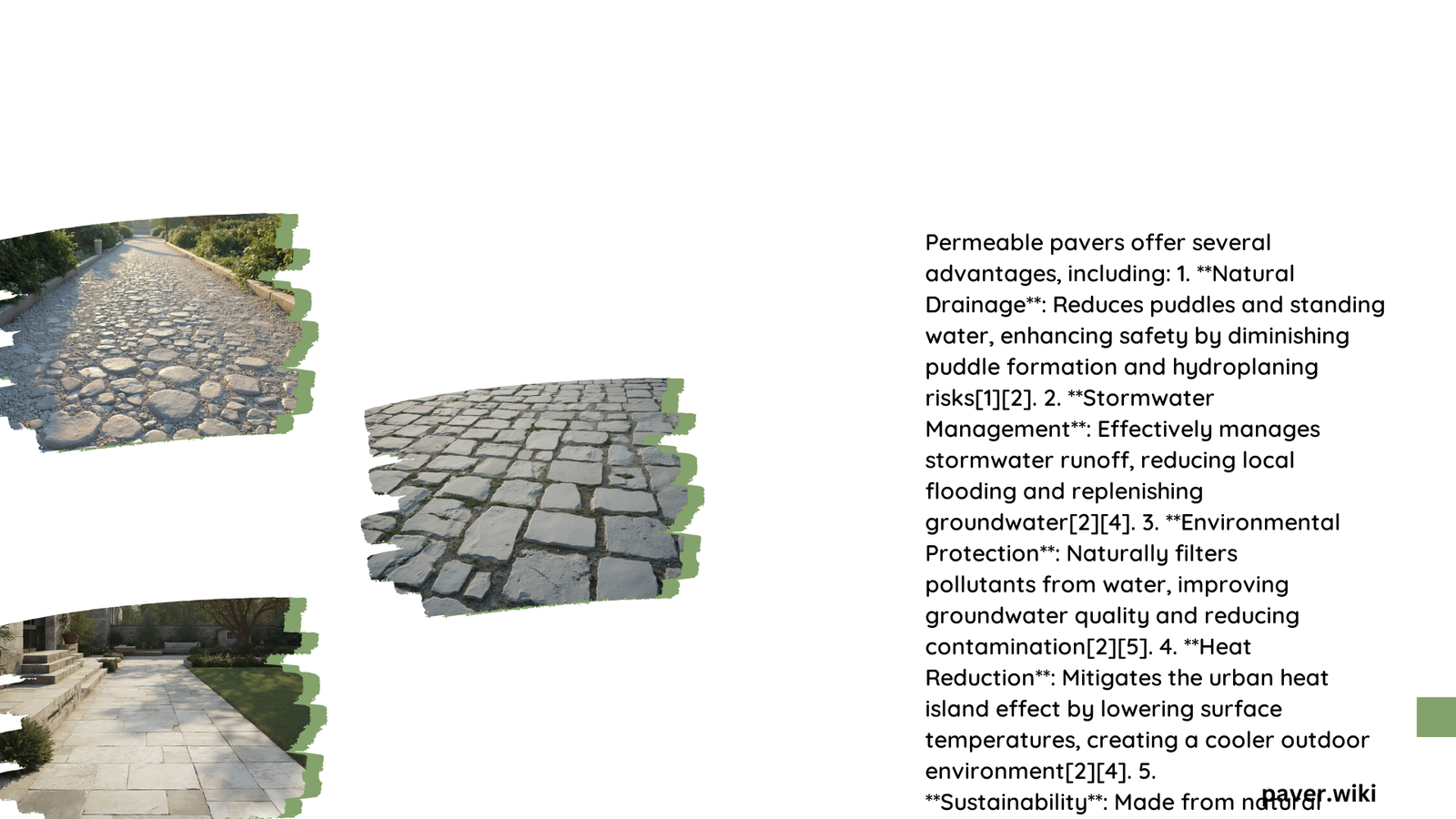Permeable pavers offer significant advantages in stormwater management, environmental impact, and long-term cost-effectiveness. These innovative paving solutions allow water to infiltrate through the surface, reducing runoff and promoting natural groundwater recharge. With superior drainage capabilities, environmental benefits, and durability, permeable pavers are becoming an increasingly popular choice for sustainable urban development and landscaping projects.
What Are the Key Drainage Benefits of Permeable Pavers?
Permeable pavers excel in managing stormwater by allowing water to pass through the surface and into the ground below. This unique feature offers several advantages:
- High Infiltration Rates: Permeable pavements can infiltrate water at rates exceeding peak rainfall, often several inches per hour.
- Reduced Runoff: Unlike traditional pavements, permeable pavers significantly decrease stormwater runoff, with some designs capable of reducing discharge by 25-100%.
- Improved Water Quality: As water passes through the pavement layers, it undergoes natural filtration, removing pollutants and improving overall water quality.
How Do Permeable Pavers Compare to Traditional Paving?
| Feature | Permeable Pavers | Traditional Paving |
|---|---|---|
| Water Management | Allows infiltration | Promotes runoff |
| Runoff Volume | Significantly reduced | High |
| Pollutant Filtration | Yes | No |
| Groundwater Recharge | Promotes | Inhibits |
What Environmental Impacts Do Permeable Pavers Offer?

Permeable pavers provide numerous environmental benefits:
- Stormwater Management: By reducing runoff, these pavers help prevent flooding and erosion.
- Heat Island Effect Mitigation: The porous nature and lighter colors of permeable pavers help lower surrounding air temperatures.
- Biodiversity Enhancement: Some permeable paver designs allow vegetation growth, supporting local ecosystems.
- Pollution Reduction: The natural filtration process removes contaminants from water as it percolates through the pavement layers.
How Cost-Effective Are Permeable Pavers in the Long Run?
While initial installation costs for permeable pavers may be higher than traditional paving options, they offer significant long-term advantages:
- Reduced Infrastructure Costs: Less need for extensive drainage systems.
- Lower Maintenance Expenses: Properly installed permeable pavers require less frequent replacement.
- Potential Tax Incentives: Some municipalities offer rebates or tax breaks for installing environmentally friendly paving solutions.
- Increased Property Value: Sustainable features like permeable pavers can enhance property marketability.
What Maintenance Do Permeable Pavers Require?
To ensure optimal performance, permeable pavers require regular maintenance:
- Biannual Cleaning: Vacuuming or pressure washing to remove debris and prevent clogging.
- Regular Inspections: Identify and address issues before they become significant problems.
- Occasional Refilling: Replace joint material as needed to maintain permeability.
How Long Do Permeable Pavers Last?
With proper maintenance, permeable pavers can last several decades. Their durability often surpasses that of traditional paving materials, especially in areas with freeze-thaw cycles or heavy traffic.
What Are the Best Applications for Permeable Pavers?
Permeable pavers are versatile and can be used in various settings:
- Residential driveways and patios
- Commercial parking lots
- Pedestrian walkways and plazas
- Low-traffic roads
- Emergency access lanes
How Do Permeable Pavers Contribute to Sustainable Urban Development?
Permeable pavers play a crucial role in sustainable urban planning:
- Green Infrastructure: They form an integral part of green infrastructure initiatives.
- LEED Certification: Can contribute to LEED points for sustainable site development.
- Smart Growth: Support smart growth principles by managing stormwater at the source.
- Climate Resilience: Help cities adapt to increasing rainfall and flooding events due to climate change.
In conclusion, the advantages of permeable pavers extend far beyond simple drainage benefits. They offer a sustainable, environmentally friendly, and cost-effective solution for modern paving needs, contributing to healthier urban environments and more resilient communities.
References:
1. https://www.epa.gov/system/files/documents/2021-11/bmp-permeable-pavements.pdf
2. https://theconservationfoundation.org/permeable-pavement-options-for-stormwater-infiltration/
3. https://www.nitterhousemasonry.com/blog/the-environmental-benefits-of-permeable-pavers/
